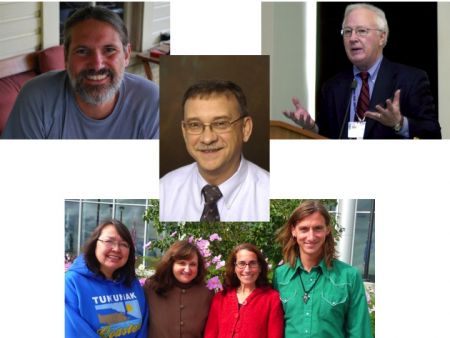
‘Taringenqegcallrat Cayarat Umyuat-llu': Indigenous Understandings in Community Based Participatory Research
Chair/Discussant: Joseph E. Trimble, Western Washington University
Other Participants: Inna D. Rivkin, Samuel Johnson, Ellen D. S. Lopez, Eliza Orr, Jim Allen, Carlotta Fok, University of Alaska Fairbanks, & David B. Henry, University of Illinois at Chicago
Culturally resonant methodologies are critical when conducting research with indigenous communities. Considerations in such research include getting at culturally-based understanding based on indigenous participants’ ways of living and thinking, translating instruments and findings when concepts lack equivalence across languages, adapting measures in ways that are both culturally resonant and able to detect change resulting from intervention, and addressing lack of comparability or cultural measurement equivalence. This symposium will discuss these challenges and strategies for addressing them, drawing on examples from community based participatory research focused on addressing health disparities in rural Alaska Native communities. Examples from the first presentation will discuss working towards an understanding of local conceptions of stress within the context of cultural change in Yup’ik Alaska Native communities, and the importance of this understanding for informing culturally-resonant intervention addressing community stress. Examples from the second presentation will illustrate challenges of translating meaning between Yup’ik and English, and strategies to integrate cultural and community knowledge for addressing these challenges within research partnerships with Yup’ik communities. The third project recounts the development of a culturally-resonant measure of family functioning for Yup’ik youth that proved to be sensitive to change associated with intervention. Issues of cultural measurement equivalence will be discussed, including the assumptions in the equivalence concept, the difficulties of true comparability, and the importance of culturally resonant measurement approaches that reflect an ethnocultural group’s unique lifeways and pathways. We will then have a discussion (with audience participation) about the advantages and limitations of approaches, and how lessons learned can inform future research. We will also discuss how the diversity of local contexts and communities can affect methodological challenges and strategies for getting at culturally-based understandings in indigenous community focused research.
Joseph E. Trimble (Session Chair), Inna D. Rivkin, Samuel Johnson, Ellen D. S. Lopez, Eliza Orr, Jim Allen, Carlotta Fok, & David B. Henry
Chair/Discussant: Joseph E. Trimble, Western Washington University
Other Participants: Inna D. Rivkin, Samuel Johnson, Ellen D. S. Lopez, Eliza Orr, Jim Allen (SCRA Member), Carlotta Fok, University of Alaska Fairbanks, & David B. Henry, University of Illinois at Chicago
Add Comment
Keywords: scra biennial conference, community psychology practice, gjcpp